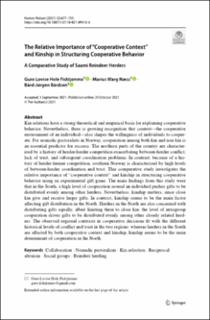The Relative Importance of “Cooperative Context” and Kinship in Structuring Cooperative Behavior: A Comparative Study of Saami Reindeer Herders
Peer reviewed, Journal article
Published version
Permanent lenke
https://hdl.handle.net/11250/2997660Utgivelsesdato
2021Metadata
Vis full innførselSamlinger
Originalversjon
Human Nature. An interdisciplinary biosocial perspective. 2021, 32 677-705. 10.1007/s12110-021-09416-6Sammendrag
Kin relations have a strong theoretical and empirical basis for explaining cooperative behavior. Nevertheless, there is growing recognition that context—the cooperative environment of an individual—also shapes the willingness of individuals to cooperate. For nomadic pastoralists in Norway, cooperation among both kin and non-kin is an essential predictor for success. The northern parts of the country are characterized by a history of herder-herder competition exacerbating between-herder conflict, lack of trust, and subsequent coordination problems. In contrast, because of a history of herder-farmer competition, southern Norway is characterized by high levels of between-herder coordination and trust. This comparative study investigates the relative importance of “cooperative context” and kinship in structuring cooperative behavior using an experimental gift game. The main findings from this study were that in the South, a high level of cooperation around an individual pushes gifts to be distributed evenly among other herders. Nevertheless, kinship matters, since close kin give and receive larger gifts. In contrast, kinship seems to be the main factor affecting gift distribution in the North. Herders in the North are also concerned with distributing gifts equally, albeit limiting them to close kin: the level of intragroup cooperation drives gifts to be distributed evenly among other closely related herders. The observed regional contrasts in cooperative decisions fit with the different historical levels of conflict and trust in the two regions: whereas herders in the South are affected by both cooperative context and kinship, kinship seems to be the main determinant of cooperation in the North.
